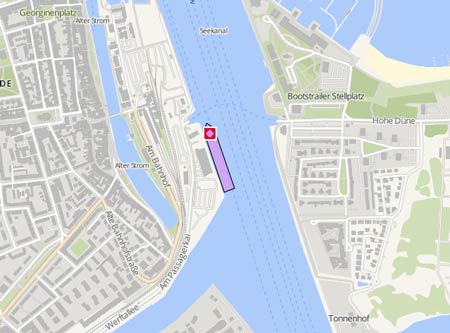ATLANTIC HURON
Latest ports
Latest Waypoints
Latest news
Report: Incorrect installation of a single set screw caused allision
The incorrect installation of a single set screw led to the loss of propulsion control on the 'Atlantic Huron', causing the ship to strike a pier at 6.8 knots on July 5, 2020, the National Transportation Safety Board said on April 27. The NTSB issued the Marine Accident Brief 21/10 on the contact between the bulk carrier and a pier of the Soo Locks in Sault Sainte Marie, Michigan, resulting in a damage of 2,2 million Dollar. According to the NTSB brief, while approaching the locks and attempting to slow, there was a propulsion problem involving the vessel’s controllable pitch propeller system that resulted in the ship moving forward with increasing speed instead of slowing or moving astern, as ordered by the captain. The NTSB investigators traced the problem back to a small set screw that was installed in a piece of the controllable pitch propeller machinery that controlled pitch. Vessel maintenance records show the set screw was last removed and reinstalled during a shipyard period more than four years before the accident. When the set screw was examined post-accident, technicians found no evidence that any manufacturer-required thread-locking fluid had been applied. As a result, the set screw was able to back out, beginning a sequence of mechanical failures that resulted in the ship moving ahead when it was supposed to be doing the opposite, while still indicating an astern pitch on the ship’s bridge.NTSB investigators also noted there was a delay between the onset of the propulsion problem and the order to stop the engine.At the time of the accident, the company’s safety management system procedures aboard the 'Atlantic Huron' did not contain a policy addressing how to respond to a loss of propeller pitch control. Part of a safety management system should address potential emergency shipboard situations and establish ways to respond to them. If the company provided an SMS vessel-specific policy pertaining to the loss of propeller pitch control, crewmembers trained in and familiar with the policy would be better prepared to act quickly and, in this accident, may have been more apt to stop the main engine.
SIU demands vacciantion of Canadian seafarers
The Seafarers' International Union of Canada, that represents 15,000 Canadian marine workers, was demanding the government come up with a plan to vaccinate seafarers after the Covid-19 outbreak on the 'Atlantic Huron' which remained anchored in the St. Lawrence River. The vessel often plies the Great Lakes and was delivering iron ore to Quebec City when the crew got sick. On April 1, the crew on the ship tested negative, but by mid-month a total of 18 of the 25 crew on board wound up testing positive for the virus. The vessel was heading to Quebec City to deliver iron ore when a deckhand first fell ill. Within a day, a mate was throwing up and feverish. The ship had to reverse course and anchor in the Thunder Bay harbour where nurses came out on a tug to test the crew for COVID. Three of the crew have been admitted to hospital for treatment. One man has been admitted twice with breathing issues.
Several crew members tested positive for COVID-19
Several of the 25 crew members aboard the 'Atlantic Huron', which docked in Thunder Bay have tested positive for COVID-19 on April 8, 2021, the day the ship arrived in port. The Canada Steamship Line as of April 11 was still awaiting confirmation from health authorities on the exact number of crew members tested positive. There had been no close contact between crew members and the Thunder Bay community. The only contact that occurred was during the transfer of the crew members from the vessel to the quarantine hotel, which was done under the strict supervision of the Thunder Bay District Health Unit and according to their protocols and guidelines. The crew members were now self-isolating at a local hotel and have so far reported only mild symptoms. The 'Atlantic Huron' remains berthed at the port while a two-day disinfection was carried out in accordance with Health Canada guidelines. Once cleared by Transport Canada, a new crew will board and continue the scheduled voyage to Quebec City. The company was still investigating how the infections occurred, given extensive COVID-19 precautions. All crew members were pre-screened prior to boarding the ship on March 31 in Sarnia, and all returned negative results from a PCR test administered the following day. The crew members were also provided PPE including masks, gloves, and sanitizer, and instructed to practice social distancing on board for 14 days. The CSL was not aware of any breach to its pre-boarding or onboard COVID-19 protocols and is working with health authorities to determine the cause of transmission. It was working with the Thunder Bay District Health Unit and other health authorities.
Upload News

